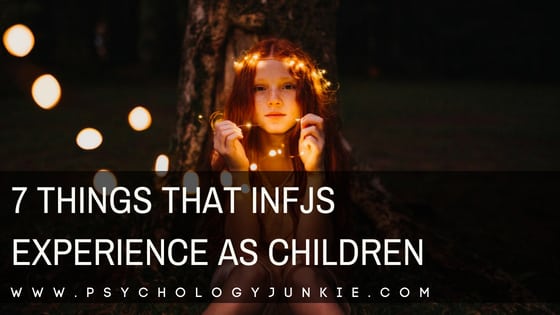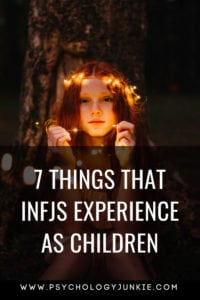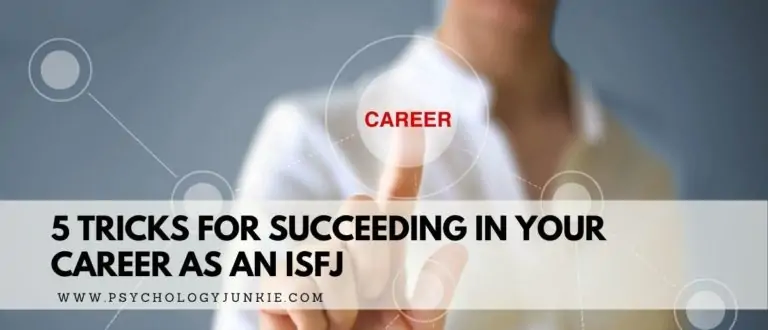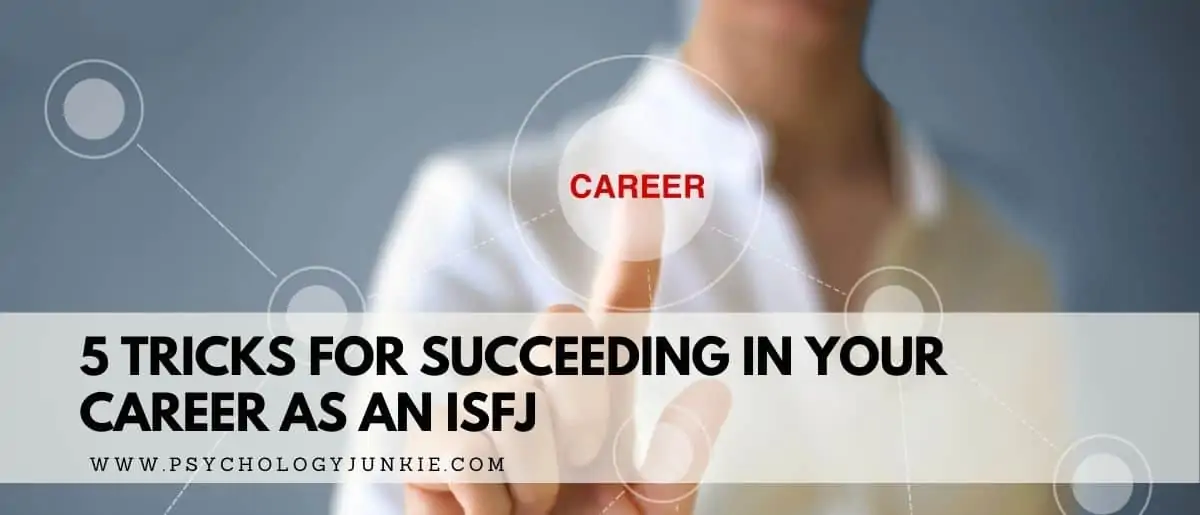7 Things That INFJs Experience as Children
INFJ children are a rare and unusual breed. They make up less than 1% of the US population, and often report having felt “odd”, “misunderstood”, or ostracized as children. That’s why I think it’s especially important to have a grasp of what it feels like being in an INFJ child’s mind. If we can take the time to understand these children then we can improve their chances of accepting themselves and reaching their potential.
Not sure what your child’s personality type is? Take our new questionnaire here!

This article contains affiliate links. I only recommend products I truly believe in.
Table of contents
Estimated reading time: 9 minutes
7 Things That INFJs Experience As Children
#1 – A Hesitancy To Accept Things at Face-Value
While the rest of the world seems to step out into their environment with certainty, easily believing that they will be supported by the walls, floors, and structures around them, INFJs second-guess everything. What is an illusion and what is real? What is the meaning beyond these concrete, tangible items? They want to transcend the material world, look beyond the senses, and beyond the limits of time itself to understand the over-arching meaning of everything. While most other children are focused on what’s happening now, INFJs are trying to figure out what “now” is in relation to everything else. In fact, what does it even mean to exist in “the now”?
Childhood can be a magical time for any personality type. All children are blessed with imagination, and they are all still trying to figure out what’s real and what’s not. But INFJs tend to take longer than other types, especially sensing types, to discern what’s real and what’s not. It’s not unusual for INFJs to report that as children they wondered ceaselessly about the nature of reality and what their place was in the theater of life. What holds the earth in the sky? Why is it held there? Why was I brought into existence? INFJ children tend to take the role of “miniature philosopher” very seriously.
#2 – A Desire to Decode Dreams
While other children might be happy with the whole “dreams don’t make sense and that’s okay” line, INFJs don’t usually subscribe to that. Introverted Intuition, the preferred mental process of the INFJ, is all ABOUT unconscious symbols and imagery…that’s right, the stuff you find in dreams.
In the words of depth typologists Leona Haas and Mark Hunziker,
“Introverted Intuiting is the keeper of the so-called sixth sense. Unexplainable information can take the form of hunches, clairvoyance, abstract intuition, and messages from the unconscious.”
Also…
“Introverted intuiting is the only perception process that is independent of the conscious mind.”
– Leona Haas and Mark Hunziker, Building Blocks of Personality
Now I’m not saying INFJs are psychic, although many experience strange feelings that seem psychic. There’s nearly always a reasonable explanation for those feelings, though.
Dreams, however, are taken very seriously by young INFJs. They analyze the symbols, the images, the underlying themes, and look for messages that might be important to them. In fact, Carl Jung, the founder of personality psychology, referred to introverted intuitives as “the mystical dreamers and seers” of the world.
#3 – A Strong Understanding of Other People’s Emotions
INFJs are extremely affected by harmony, conflict, stress, or anger. They are very empathetic children and are particularly tuned into the emotional environment of their families or classrooms. One of the reasons they enjoy solitude so much is because they can separate themselves from the overwhelming emotions of other people. ]
INFJs tend to feel responsible for other people’s feelings like they have to “fix it” if things are bad. This is thanks in part to their auxiliary function, Extraverted Feeling. At a young age, this function isn’t very well-developed yet, so it feels overwhelming and stressful for young INFJs to tap into frequently.
Psychologist David Keirsey says of INFJs,
“This type of Idealist has strong empathic abilities and can become aware of another’s emotions or intentions – good or evil – even before that person is conscious of them. Such mind-reading can take the form of feeling the hidden distress or illnesses of others to an extent which is difficult for other types to comprehend.”
– David Keirsey, Please Understand Me
Young INFJs are so conscious of how other people are feeling that they can have difficulty understanding how they themselves feel. At times, this empathy can be a gift. They may know just what’s bothering someone and what to say to encourage them. Other times it can be a curse, and they can feel overwhelmed by emotions they don’t understand because they aren’t their own.
This is one of the reasons it’s very important for parents of INFJs to give them plenty of alone time and to keep the environment as conflict-free as possible.
#4 – Distraction
INFJs are drawn to complexity on a constant basis. Remember how I said they don’t take anything at face value? Well, that certainly applies to their interactions with people. INFJs analyze what people are saying to them, always looking for hidden intentions, meanings, symbols, and significance. And if they’re on their own they can get so lost in their imagination that the outer world becomes silent to them.
This can mean that one of two things happen when you’re talking to them:
1 – The young INFJ is so focused on analyzing what you said in the first two minutes of the conversation that they lost track of what you’re currently talking about.
2 – If they are playing on their own, they can be so lost in their imagination and ideas that they didn’t realize you said something to them or gave them a direction. This adds up to them being very confused fifteen minutes later when you said, “but I TOLD you to come in for dinner!”
#5 – Intense Frustration Over Interruptions
INFJs have a difficult time switching gears in childhood and adulthood. They like to fully immerse themselves in what they’re doing. They frequently get into a meditative, calm, focused state when they are analyzing, creating, or imagining. It’s as if the rest of the world goes quiet and everything seems peaceful yet alive. When someone bursts in on them during these times, they can seem annoyed, irritated, or overwhelmed. They may cast off their normally kind-hearted disposition and seem surprisingly harsh or sarcastic. That’s because when they’re in these states they are usually tapped into their dominant function, Introverted Intuition, NOT their feeling function, which comes second.
Basically, it takes them a while to revert back to the “I’m around people, so I better tap into their feelings and their needs” phase.
#6 – Perfectionism
If you see a young INFJ repeatedly balling up the story they are writing, tossing it in the trash, and scowling furiously, then you might have caught a glimpse of INFJ perfectionism. Young INFJs have extremely idealistic hopes for the projects they create. Bringing their ideas out into the world is often stressful and time-consuming for them. They feel that the real thing “must” live up to their idealized image. It doesn’t help that they tend to have complicated, substantive projects in mind and not simple ones. They can re-work, throw away, modify, adjust, and correct their project so many times that they end up in a state of exhaustion.
If you’re the parent of an INFJ, it’s important to give them some space when they’re working creatively. If they’re not happy with what they’re doing, continue to give them space, even if you feel like you must step in. INFJs tend to be very sensitive about their work and won’t want feedback until they are ready to ask for it. And they will ask when they are ready most of the time. When they do ask for feedback, try to be as positive as possible and give specific compliments, not generalized ones. If they want suggestions, be sure to mix criticism with praise for what they are doing well.
Related: The INFJ Workaholic
#7 – Loneliness
Young INFJs soon discover that most of the world doesn’t operate in the same way that they do. Not every other child wonders about the nature of reality, why they exist, what this symbol means for that future, or what will happen in 50-100 years. Not everyone gets these sudden “hunches” about what will happen that they can’t explain because it hasn’t sorted itself out yet. INFJ visions, so clear inside their mind, often come across as halting or rambling in person. They may feel they know something very strongly and feel as if they must tell someone about it, but then be met with ridicule, skepticism, or mocking when they finally do.
Almost every INFJ I’ve spoken with has at one point in their lives come to a realization that their way of seeing the world isn’t generally accepted or understood. They often come to a point where they learn to keep things inside and they begin to question everything that comes naturally to them. It is extremely rare for young INFJs to find a like-minded individual who understands them, shares their feelings, and trusts their insights. You can find out more about INFJ loneliness here.
It’s important for parents of young INFJs to take them seriously, to answer their questions, to not belittle their process or “rush them along” when they’re trying to explain an insight. With encouragement and open-minded acceptance, INFJs can be catalysts for positive change in the world.
What Are Your Thoughts?
What have your experiences been as a child? Do you have any thoughts to add? Let us know in the comments!
Want to Book a One-on-One Type Consultation with Me?

Not sure of your personality type? I can help you! As the founder of Psychology Junkie and an MBTI® practitioner I’ve spent over seven years helping people discover their true personality type. Use the scheduler below to book a session with me!
Want to Find Out More About the INFJ?
Check out my eBook, The INFJ – Understanding the Mystic.
Want to Discover Your Child’s Personality Type?
Check out my eCourse, Parenting by Personality Basics.
Other Articles You’ll Love:
7 Reasons Why You Need an INFJ Friend in Your Life
10 Ways INFJs Can Boost Their Creativity
3 Weird and Wonderful Secrets About the INFJ
10 Things You’ll Relate to If You’re an INFJ

Subscribe to Our Newsletter

Want to discover more about personality type? Get the inside scoop with Susan Storm on all things typological, along with special subscriber freebies, and discounts on new eBooks and courses! Join our newsletter today!











This is almost scary.
Are those aspects too uncommon on adult INFJs? I’ve been exactly this person described since I was a child, and I don’t know it it is because I am an artist, but never snapped out of these aspects.
This is by far the most accurate I’ve read about INFJs. Reading it made me understand myself more and realized what I’ve done in my past. I thought I’m just weak when it comes to emotions and so sensitive about others’ opinions of myself without knowing my own personality. Sometimes I blame myself for being so timid in front of my classmates but actually, I’m afraid of what they will feel when they talk to me or what their thoughts of me. I’m scared that they will be disappointed with me or ignore me. My emotions back then was a roller coaster and I became depressed thinking why I don’t have the guts. I cried every night because of those thoughts. To settle my feelings, I befriended people the same as me and sometimes compare myself to them and I’m guilty of feeling satisfied if ever we do projects and mine is better than them. I’m only happy if they praise my artworks. At times, I really don’t get why some of my classmates are able to do whatever they want and openly talk loudly even in front of teachers and how they are so confident. Is it because we’re in different schools before? Or they are just trained to talk openly that way without any care in the world. I think too much whenever I talk to them and try to reply to what they will like to hear. It’s awkward and it felt like I have a lot of personalities that automatically adjust when I talk to different people. I’m so sensitive to their feelings that I don’t know what to do with my own. I’m that girl in the background that listens to confident people and only talks when it’s necessary. Oddly enough, when I’m with people I don’t know, I try to be talkative and be whoever I want and it makes me happy.
when i was a child i use to be very very much into a all different world of imagination.i used to spend much time in the woods on my own, sing songs and have so many stories in my head, i use to talk in my head to what i perceived as spirit guides, or angels or spirit friends. i use to write poems and stories since i was very little, and i use to have very intense dreams that would wake me up in the night.
i did not fit in at all with kids at school, and i was bullied all the time. i moved about 5 schools and bullied everywhere, for no specific reason, maybe i just looked different and spaced out. it was very hard for me to stay concentrated in class and some teachers thought i was autistic.
many people told me that i use to come up with very profound comments and advices for them and they felt quite shocked as it felt strange to get such wise comments from a little kid.
Wow. I am in my early 30’s and I live in Lagos . I don’t know how I have just found out about this but all your articles about INFJ’s is exactly me and the weird fact that I always know what someone is about to tell me just before they do. I also have dreams that come to fruition so many times or something will just cross my mind out of nowhere like when I told my mom two yrs ago out of nowhere my two sisters will have babies by her 60th birthday which also came to pass . My family has always trusted my intuition about people but sometimes I don’t see the coming hurt for myself , just for others . Other times I do, and didn’t use to take it serious till I started predicting things and it came to pass . I am so glad I am not weird . I always wondered why I never fit in as a child with my siblings and friends . I also wondered why I could never solve simple maths but somehow always made an A+ in further maths. Amazing ! Thank you so much for this posts . Love it !
When I was a child, I did a lot of daydreaming in school. It was difficult for me to focus in school and I think the reason why was because, after school, me and my sister would go to our grandparents house along with other cousins. We would then get home by 6pm in the evening. Sometimes there were distractions at my grandparents house that I wasn’t able control. I really believe that this affected my schooling. It wasn’t until about 7th grade when I was able to fully control and understand the study habits that was best for me.
Same. Like I couldn’t pay attention to teachers and always used to feel I don’t need any teaching to understand things. I only did self study at home and used to get good grades which kinda made me self dependent.
Wow! This was me and still is. My imagination was so intense that when I wasn’t playing with other children, I would always choose to be alone in my room where I would make up very intricate stories in my head. I would stare at the wood grain on my dresser and see all kinds of images as well as my floral pattern curtains. Both of these object were so much more to me than just a dresser or curtains. I loved playing in the woods because it was not just woods to me, but a whole new magical world and time. I remember breaking a pink frosted glass and crying so hard over it. My mother told me I did not have to worry, that I was not in trouble for breaking the glass. That was not why I was crying. To me that glass was alive, it was it’s own being and I knew it was forever changed. I could go on with many other examples but I will stop here. I was always considered by my family and friends as dingy and air headed, but I know it was much deeper than that.
This is ABSOLUTELY accurate! One of the funniest parts of the article was when you mention the frustration of being interrupted. I still do this as an adult and never knew why I would become SO mad when I felt interrupted haha. Great article!
I Am also an INFJ. But teen one.
I remember all the things. My mom usually says that when I was a child, my kindergarten teachers almost said that I am a mental case. Because of my weirdness and such things, people didn’t like to be friends with me. That’s Alright as I have gradually grown up, I gradually learn things and understand the world. And my understanding of things is much higher than my age fellows. I am glad that I am INFJ. Indeed being INFJ is a blessing but yet is a curse.
As a teen INFJ,I know exactly what you are talking about.I just wanted to say, I’m both happy and sad that there are more people out there who is like me.I’m happy that there are people who understands me and can relate to me ,but I’m sad that other people has to go through same suffering as me,like constantly being judged,misunderstood,unappreciated and hated,no matter how good you treat others.
So my daughter is an infj and all of these are 100% her. She always tells me she feels like noone understands her, she is an amazing artist and shes 7. I am an ENFP totally, and so I feel like I try to always encourage her, but sometimes I also can be my joking enfp self and I notice that when we are just playing around for instance I sing that song “anything you can do I can do better, I can do anything better than you …. no u can’t, yes I can…..” just randomly bc it popped in my head and I told her where it came from and stuff and we laughed a little but when she did it and I said no u can’t she took it personal. I’m like what? We were just joking. … then she tried to turn it around but she always seems to end in a negative manner sometimes and it confuses me. So any advise from infj people and if they ever experienced that and what I can do as her mom to kind of stop the negativity ending. Bc I literally try everything. Sometimes I’m just like man I love u let’s leave it at that. So any tips help plz. Thank u bc shes an amazing deep brilliant beautiful special girl with so much to offer the world and it’s my job to make her the best human god created her to be. 🙂 ♡
I’m an INTJ, when I was younger I remember my parents being worried about me because I was sometimes “mad” or “silent”, they thought I was too extreme and sensitive with my emotions, and they used to tell me “stop being like that and control your emotions”, that would sometimes hurt me thinking something was wrong with me and I used to try so hard to be like they wanted me to be, and then I stop sharing how I really was feeling to them. Later in life I realize that nothing was really wrong, INTJs just think/feel things differently… a different perspective lets say (also my parents realized nothing was wrong with me, I have a great relationship with them).
Share with her INTJ articles so that she can understand herself better (sometimes we feel like nobody understands us, so that will help her) and my suggestion to you as a mom is… you can’t change her reactions, that’s how she feels… don’t make her feel like she is crazy, just let her be… We are emotional, but it won’t stop her from being who she wants to be cause we are extremely logical as well so at the end of the day is balanced, and we have no hard feelings (even if it seems we do). I hope this helps you! 🙂 🙂 🙂